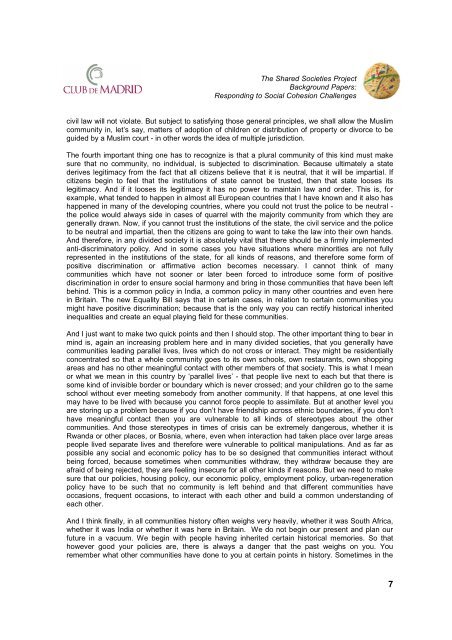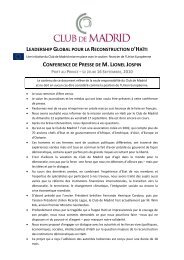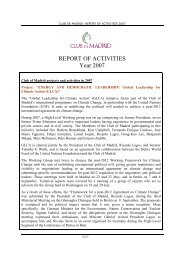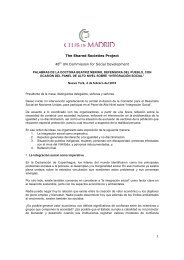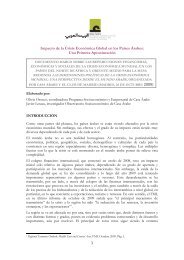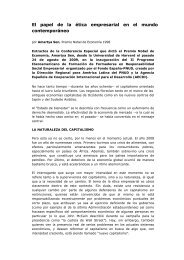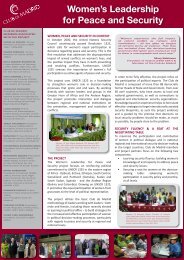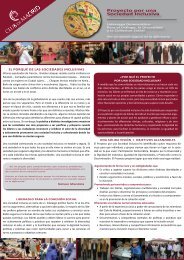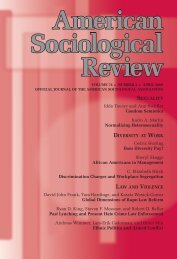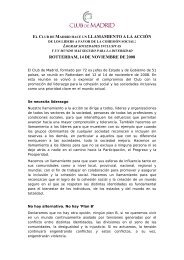Social Cohesion Challenges, Needs and Political ... - Club of Madrid
Social Cohesion Challenges, Needs and Political ... - Club of Madrid
Social Cohesion Challenges, Needs and Political ... - Club of Madrid
- No tags were found...
Create successful ePaper yourself
Turn your PDF publications into a flip-book with our unique Google optimized e-Paper software.
The Shared Societies ProjectBackground Papers:Responding to <strong>Social</strong> <strong>Cohesion</strong> <strong>Challenges</strong>civil law will not violate. But subject to satisfying those general principles, we shall allow the Muslimcommunity in, let’s say, matters <strong>of</strong> adoption <strong>of</strong> children or distribution <strong>of</strong> property or divorce to beguided by a Muslim court - in other words the idea <strong>of</strong> multiple jurisdiction.The fourth important thing one has to recognize is that a plural community <strong>of</strong> this kind must makesure that no community, no individual, is subjected to discrimination. Because ultimately a statederives legitimacy from the fact that all citizens believe that it is neutral, that it will be impartial. Ifcitizens begin to feel that the institutions <strong>of</strong> state cannot be trusted, then that state looses itslegitimacy. And if it looses its legitimacy it has no power to maintain law <strong>and</strong> order. This is, forexample, what tended to happen in almost all European countries that I have known <strong>and</strong> it also hashappened in many <strong>of</strong> the developing countries, where you could not trust the police to be neutral -the police would always side in cases <strong>of</strong> quarrel with the majority community from which they aregenerally drawn. Now, if you cannot trust the institutions <strong>of</strong> the state, the civil service <strong>and</strong> the policeto be neutral <strong>and</strong> impartial, then the citizens are going to want to take the law into their own h<strong>and</strong>s.And therefore, in any divided society it is absolutely vital that there should be a firmly implementedanti-discriminatory policy. And in some cases you have situations where minorities are not fullyrepresented in the institutions <strong>of</strong> the state, for all kinds <strong>of</strong> reasons, <strong>and</strong> therefore some form <strong>of</strong>positive discrimination or affirmative action becomes necessary. I cannot think <strong>of</strong> manycommunities which have not sooner or later been forced to introduce some form <strong>of</strong> positivediscrimination in order to ensure social harmony <strong>and</strong> bring in those communities that have been leftbehind. This is a common policy in India, a common policy in many other countries <strong>and</strong> even herein Britain. The new Equality Bill says that in certain cases, in relation to certain communities youmight have positive discrimination; because that is the only way you can rectify historical inheritedinequalities <strong>and</strong> create an equal playing field for these communities.And I just want to make two quick points <strong>and</strong> then I should stop. The other important thing to bear inmind is, again an increasing problem here <strong>and</strong> in many divided societies, that you generally havecommunities leading parallel lives, lives which do not cross or interact. They might be residentiallyconcentrated so that a whole community goes to its own schools, own restaurants, own shoppingareas <strong>and</strong> has no other meaningful contact with other members <strong>of</strong> that society. This is what I meanor what we mean in this country by ‘parallel lives’ - that people live next to each but that there issome kind <strong>of</strong> invisible border or boundary which is never crossed; <strong>and</strong> your children go to the sameschool without ever meeting somebody from another community. If that happens, at one level thismay have to be lived with because you cannot force people to assimilate. But at another level youare storing up a problem because if you don’t have friendship across ethnic boundaries, if you don’thave meaningful contact then you are vulnerable to all kinds <strong>of</strong> stereotypes about the othercommunities. And those stereotypes in times <strong>of</strong> crisis can be extremely dangerous, whether it isRw<strong>and</strong>a or other places, or Bosnia, where, even when interaction had taken place over large areaspeople lived separate lives <strong>and</strong> therefore were vulnerable to political manipulations. And as far aspossible any social <strong>and</strong> economic policy has to be so designed that communities interact withoutbeing forced, because sometimes when communities withdraw, they withdraw because they areafraid <strong>of</strong> being rejected, they are feeling insecure for all other kinds if reasons. But we need to makesure that our policies, housing policy, our economic policy, employment policy, urban-regenerationpolicy have to be such that no community is left behind <strong>and</strong> that different communities haveoccasions, frequent occasions, to interact with each other <strong>and</strong> build a common underst<strong>and</strong>ing <strong>of</strong>each other.And I think finally, in all communities history <strong>of</strong>ten weighs very heavily, whether it was South Africa,whether it was India or whether it was here in Britain. We do not begin our present <strong>and</strong> plan ourfuture in a vacuum. We begin with people having inherited certain historical memories. So thathowever good your policies are, there is always a danger that the past weighs on you. Youremember what other communities have done to you at certain points in history. Sometimes in the7


